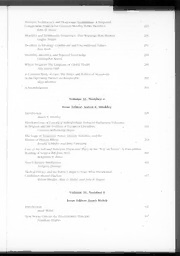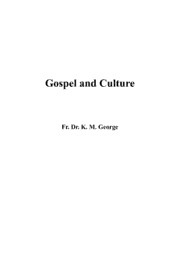
Gospel and Culture / Fr. Dr. K. M. George PDF
Preview Gospel and Culture / Fr. Dr. K. M. George
Gospel and Culture Fr. Dr. K. M. George 2 Contents 1. Learning the Alphabet 2. In Tune with Philosophy 3. In Defence of Faith 4. Pilgrimsí Progress 5. In the Service of the Gospel 6. Gospel, Cultures andTransfiguration 3 1. Learning the Alphabet ìWhat has, Athens to do with Jerusalem? What concord is there between the academy and the church?î This famous question raised by Tertullian, lawyer turned theolo- gian in the Roman colony of Carthage in the third century, still rings in the ears of many Christians. Athens stands for culture and Jerusa- lem for Christian faith, and ìthe twain shall never meetî. But Tertullianísís rhetorical elegance did not touch the :Real is- sue. More perceptive theologians and writers of the early Christian centuries would be deeply embarrassed by the suggestion of a radi- cal dichotomy between Christian faith and human culture as made by Tertullian with such neat self-confidence. The issue of culture had to be tackled with seriousness and sensitivity, not brushed aside with a shallow complacency. It is commonplace to say that Christian faith was not born into a vacuum. It issued out of a well-defined culture the deeply religious, .monotheistic and highly organized Jewish culture. It soon entered mainly into a ìhighly sophisticated Hellenistic culture within the vast frame of the imperial order. From its original west Asian home, apos- tolic Christianity spilled over into areas outside the Roman imperial borders as well. It flourished on the banks of the Euphrates and the Tigris in the Persian empire, in the Nile valley in Egypt, Ethiopia and Sudan, along the southwestern costal region of India. In these places Christian faith was introduced to contexts highly flavoured with the ways and values of ancient civilizations. But the major encounter between Christian faith and secular cul- ture during the first four centuries took place within the Graeco-Ro- man context. It was unique in that it left for posterity a vast literature and other records on the basis of which we reconstruct today the Christian experience of the early centuries. So sweeping and thor- ough going was this contextual experience of the early centuries that it later became difficult to recognize that it was only one of the many possible contexts. The Roman imperialí order around the Mediterra- nean, the conversion of almost all the people of Europe to Christian 4 faith and the subsequent flourishing of European civilization on the Graeco-Roman ëcultural foundation,í the colonial expansion West- ern European civilization ó all contributed to make that context look privileged, even exclusive. A particular context thus claimed univer- sal significance. The development of the Christian notion of oikoumene within the confines of the imperial-political oikoumene, that is, the Roman em- pire, certainly had its advantages for the vigorous growth and expan- sion of Christianity. However. It also led mainstream Christianity later to forget that the Christian faith had made a heroic and risky effort to . Grapple with the issue of culture and socio-political order within the particular context of the Roman_ empire. Awareness of this in the pre-Constantinian church was blurred by the triumphalism and universalism of post-Constantinian Christianity. Western Chris- tianity continued this spirit. It took for granted the continuation of Romanitas in the ideals of Christendom and later in the colonial and missionary cultural conquest of the world. The reaction against ìclas- sical theologyî and absolutist dogmatic claims, which has set in to- day in various forms of ìcontextual theologiesî in Asia, Africa and Latin America, is rooted in this historical situation. The first three centuries of encounter between Christian faith and pagan culture were predominantly marked by a threefold spirit of defence, witness and proclamation, The early theologians and church leaders had to defend the highly misunderstood and misrepresented Christian faith against the preju- dices and abuses of their neighbours. A magnificent array of learned Christians, some of them practitioners of Hellenistic philosophy and rhetoric before their conversion to Christian faith, took up this task. It was an intellectual theological dialogue ó sometimes acrimoni- ous, sometimes friendly and respectful ó between the ìnewî faith and the long-established and complacent Hellenistic culture. The Christian church of later centuries reaped the harvest of this daring early dialogue with the ìpaganíí with the secular, with the political- social builders of culture. The defenders of faith did not hesitate to use the powerful instruments of literary, logical and philosophical wealth of the world in the service of the gospel. 5 During this period the very fact of being a Christian implied the risk of witnessing martyria. to Christ with oneís own life. Many Christians simply chose the way of martyrdom at a time when the Roman authorities resorted to coercion and torture to suppress a de- fiant faith that did not conform to the polytheistic, emperor-worship- ping, morally negligent religion of the state. The martyrs affirmed with an unworldly poise and calm that they were Christians and would choose death rather than renounce Christ. The story of the great ma- jority of these silent martyrs has gone unrecorded. The task of interpreting the fact of Christ and that of the Christian community in the terms and style that appealed to people around was an urgent one; and the early pioneers of the Christian faith took it upon themselves with great care and seriousness. In the midst of per- secution and adversity they proclaimed Christ the eternal Logos now incarnate, dwelling in the midst of believers through the Holy Spirit. They interpreted the formation of the faith community through bap- tism and its abiding in faith, hope and love through the regular cele- bration of the Eucharist. They hinted at the mystery and paradox of one God in three persons and three in one as ï underlying the unity and diversity of Godís creation and of the church! Thus it was-al- ready during the long centuries of oppression and marginalization that the church elaborated- and systematized the essentials of faith in Christ to be proclaimed to the world. The sense of Christian identity was now being given concrete forms of expression. By the -end of the Third century there was a rapidly developing institutional thrust in the internal life of the church, in its faith, order and discipline. The church had still to wait for the Edict of Milan in order to become a tolerated religion (religio licita), and for a .few more decades after that to be established as the official religion ëof the empire. By that time the gathering of self-confidence and the growing wofldliness of its ministers and institutions provoked a strong reaction which hastened the burgeoning ascetic-monastic movement. Zealous Christians fled the city and the urban church to seek refuge in the silence, and the arid emptiness of the desert. An opposition grew up between the civilized city, the symbol of the corrupting world, and the desert, the place for the ascesis of the inner person in view of 6 the true human destiny beyond the world. Originally the ascetic movement marked a setback to the dialogue that had been well underway between Christian faith and human cul- ture. Many well-meaning ascetics despised, ignored or relativized culture, even the simple art of letters. Some of the highly cultivated monks consciously rejected their learning in a romantic idealization of the simple and the rustic as better channels of divine wisdom. Representative of the spirit of early desert spirituality is a story told of an early Egyptian father: Once Abba Arsenios revealed his thoughts to an Egyptian elder and asked him about them. But a certain other monk saw him and said to him: ìAbba Arsenics, you have had so much education In Greek and Latin, yet you ask this man, so unlettered in worldly knowl- edge, about your thoughts?î Abba Arsenios said to him: ìIndeed, I know Roman and Greek letters well; but I have not yet learned even the alphabet of this simple man.îí The situation would change later with theologians like the Cappadocian fathers, who would find no essential dichotomy be- tween secular learning and divine wisdom, and would use the former in the service of the latter. NOTE 1 Archmandrite Chrysostomos, The Ancient Fathers of the Desert, Brookline MA, Holy Cross, 1980, -. 19. 7 2. In Tune with Philosophy The early Christian community arose from the Jewish matrix of and was profoundly .marked by the religious culture of the Jews. The. Christian church was understood for a long time by the Roman authorities and cultured elite as a rather curious sect of Judaism. They heaped all the displeasure and prejudice they had about Jewish reli- gion and-way of life on Christians as well. The Jewsí exclusiveï reli- gious beliefs and practices and their.-imageless and ë strict^ mono- theistic worship aroused suspicion among the polytheistic Gentile neighbours. So the .Christian communities too were looked down on with eyes of mistrust and contempt. As the Christian-church gradually emerged from the Jewish reli- gious tradition-as a distinct faith; rooted in the,î radically new rec- ognition of Jesus of Nazareth as-the crucified and risen-Messiah, the church then confronted hostility from the Jews on the one hand and from the so-called pagan World, with its reputed Hellenistic.-learn- ing .and forms of popular religions, on the other. From the former the church began a long weaning process, while admitting the Hebrew scripture as part of its own scripture. With the latter the church took up the double task of dialoguing with the high culture in a spirit of appreciation and respect while sharply criticizing the popular idola- trous ìpaganî religion. In Christianityís cultural encounter the dominant partner was Hel- lenistic culture, which had already established itself three centuries before Christ around the Eastern Mediterranean, and of which out- posts were found as far away as the borders of India. The word hellenismos (from hellenizo, ìto speak Greekî) originally denoted the correct use of the Greek language unadulterated by the corrupt- ing influence of foreigners coming to Athens in the fourth century B.C.E. By the time of early Christianity, it evoked a whole complex of concepts, thought-patterns, categories, images and metaphors con- veyed through the Greek language.í To the great advantage of the young Christian faith, which still bore its Jewish, birthmarks, the Jews of the Roman empire were Hel- lenized both in the diaspora and to a great extent even in Palestine. 8 Philo of Alexandria, an elder contemporary of St. Paul, was a shining example of the Hellenized Jew who could interpret the Jewish tradi- tion entirely in terms of Greek philosophical concepts and catego- ries. Paulís ascent to the Areopagus of Athens, that ìvenerable spotî of Greek philosophy dramatically ë narrated in the Acts of the Apostles, is considered highly symbolic of the meeting of the Christian faith and the dominant culture. Paul, the hellenized and converted Jew, there speaks to the Epicurean and Stoic philosophers about the ìun- known Godî and quotes a Greek poet. He chose the philosophical and literary heritage of the Greek culture as the springboard for dia- logue and thus set the model for all later Christian theologians. If the early Christian theologians considered Greek culture (paideia, ìedu- cationî ó approximately the counterpart of our present-day intel- lectual and literary culture) as the quintessence of ^secular culture, they were convinced that Christianity, the paideia of Christ, was to be the continuation of the ancient Greek culture. The non-canonical author of the Acts of the Apostle Philip puts the words into Philipís mouth: ìI have come to Athens in order to reveal to you the culture {paideia} of Christ. He meant that Christ, the source of the new Chris- tian culture, replaced the classical culture of the Roman empire, and that Greek wisdom had become its instrument and handmaiden. Striking an ultimate contrast with the arrogant flamboyance of Greek learning or the wisdom of this world, Paul pointed to the fool- ishness of the cross of Christ. Yet discerning Christians did not de- spise wisdom. In fact they sought a higher ìwisdom. Very soon-Chris- tian faith became understood as a new philosophy,, the true love of wisdom. -Christians are: philosophers. The Christian monastic tradi- tion further restricted the term to the domain of the ascetic vocation, the true philosopher is the monk. In their early contacts with the Jews in Alexandria in; the third century B.C.E. learned Greeks called the Jews a ìphilosophical raceî, signalling their appreciation that the Jews had developed the idea of the fundamental unity of the divine principle ofíthe world. Philoso- phy also provided the link in the encounter of Greek culture with Asian cultures:- Philosophers in Alexanderís retinue on their way toíIndia were 9 deeply impressed by the ìnaked philosophersî (gym-, nosophoi) of India. There are interesting stories of Alexanderís encounter with the Indian ascetic philosophers, who were told of Plato. Pythagoras and Diogenes but apparently were not very impressed.4 It was the challenge of an alien culture that provoked the transla- tion of the Hebrew scriptures into Greek. Werner Jaeger thinks that what prompted the creation of the Septuagint, the Greek translation of the Hebrew scriptures, was the curiosity of the Greeks in Alexan- dria to discover what they called the philosophy of the barbarians. A theological dialogue simply opens up between two persons, as in the case of Trypho the Jew and the Greek philosopher in Justin Martyrís work, when one says to the other: ìI see you are a philosopherî, and the other confirms it. Immediately, the two strangers are locked in a theological conversation. A philosopher is thus commonly assumed to be a person interested in God. Generally speaking, most of the second- and third-century Christian fathers took for granted the pre- paratory value of Greek philosophy for the gospel of Christ, and they wouldî mention respectfully the ìbarbarianî wisdom of the Chalde ans, Egyptians. -and Indians. ìPhilosophyî, said Justin ëMartyr, ìis a very great possession and very precious in the eyes of God..í Those who have applied their mind to philosophy are truly saved.î5 He goes on to say that philoso- phy is reallyíone , single unified form of knowledge. It is the result of an intense search for truth, a way of union with God. How-ever, the different schools of philosophy-Platonic, ëStoic, Peripatetic, Pythagorean - came about because the disciples of the pioneers in philosophy were content toî, follow their names without ëthemselves searching for the one truth. Clement of Alexandria recognizes special divine inspiration and assistance to the great philosophers. ìThese are the leaders and edu- cators through whom the operation of providence is manifested with special clarity every time that God wishes to do more good by means of culture (paideia) or by some principle of thought or act of divine governance.î6 Two notable exceptions were Tertullien (as we saw in the previ- 10 ous chapter) and Tatian. Tertullian would not accept that Christianity is a philosophy. For him the distinction between the faith of the Chris- tian church and the rationality of philosophy was clear-cut. He in- sisted on the superiority of faith over reason, thus anticipating the later Western dichotomy of reason and faith. Tatian, an intellectual from Assyria who was well versed in Greek language and culture, was vehemently opposed to the assimilation of Greek culture. In so doing he can probably be seen as the herald of the later opposition of several cultures in Asia and Africa to the domineering assumptions of Hellenistic culture at the time of great christological controver- sies. The sweeping impact of Greek education and culture (paideia) on Christian thinking and formulations is not always fully recog- nized by the present-day church. What we sometimes assume to be an originally and exclusively Christian notion may have its origin in another cultural matrix. Clement, bishop of Rome, writing to a Corinthian church that was torn by internecine conflicts, exhorted them to concord and obedience using the rhetorical methods and style of the pagan masters. Concord (homonoia) the high ideal of commu- nity proposed by Clement, had been the regular slogan of political leaders, educators, poets and peacemakers in the classical Greek city- state (polis):1 Concordia had become a goddess in Rome, invoked by people and rulers alike. Philosophers had extolled concord as the principle that holds the universe together, the organizing instrument of world peace and cosmic order. Clement was probably inspired by Paulís metaphor of the body and limbs in 1 Corinthians 12. The story of the strife between the members of the body until they finally realize that they are all mem- bers of one body and need each other goes back to Greek sources. Clement himself uses these sources in praise of homonoia, now evoked as the unity and concord of the body of Christ. The church is preeminently the Body of Christ in Pauline and later patristic understanding: it represents the model of the ideal new humanity which the Christian faith proclaimed. However, the ideals of the Greek polis played a key role in the formation of this idea. The word (ekklesia) itself demonstrates it. Obviously the biblical Chris-
The list of books you might like

Credence

Believe Me

The Spanish Love Deception

$100m Offers

Illinois PTAC ... annual report

The Retirement Years

Bycatch, utilization, and discards in the commercial groundfish

Avertissements Agricoles - Grandes cultures - Bretagne - 2006 - 2

Eczema Free in 30 Days
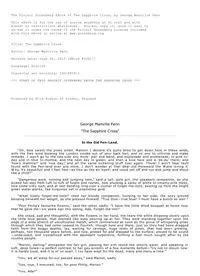
The Sapphire Cross by George Manville Fenn

Thin Solid Films 1993: Vol 229 Index
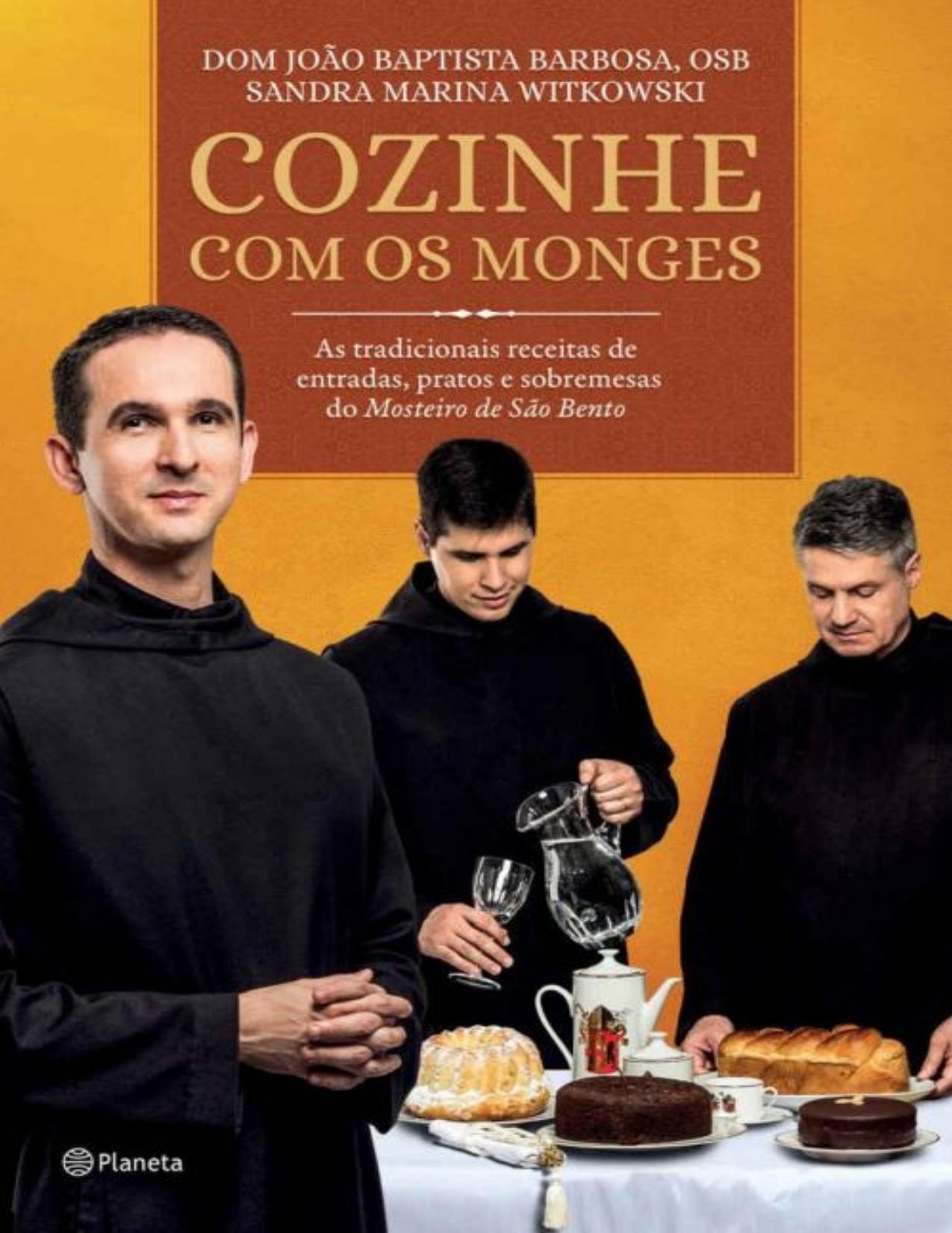
Cozinhe com os monges
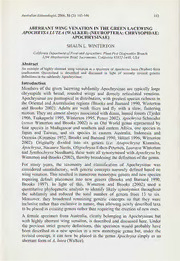
Aberrant wing venation in the green lacewing Apochrysa lutea (Walker) (Neuroptera: Chrysopidae: Apochrysinae)

General Subjects 1993: Vol 1158 Index

The Conjurer of Venus by Conan T Troy

Clinical Asthma: Theory and Practice

The Three Hostages
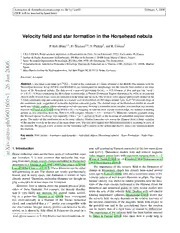
Velocity field and star formation in the Horsehead nebula
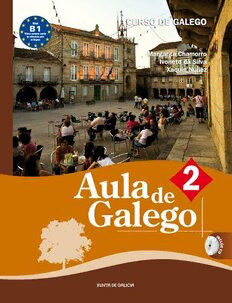
Curso de Galego. Aula de galego 2
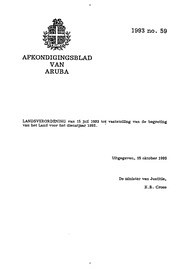
Afkondigingsblad van Aruba 1993 no. 59



